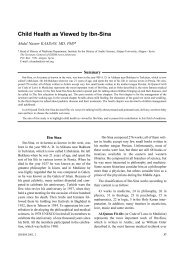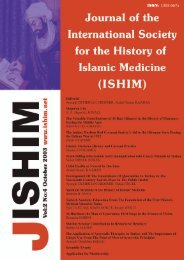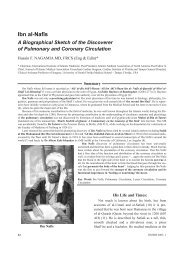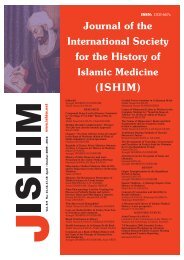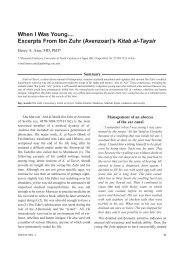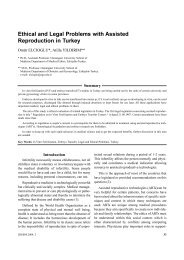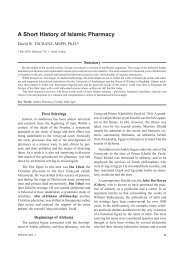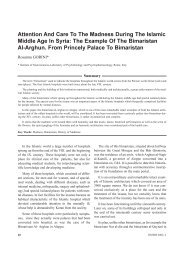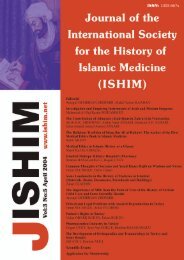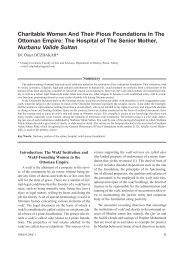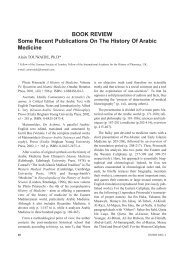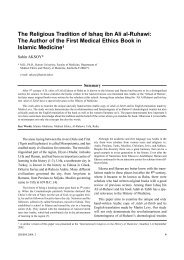Journal of - International Society for the History of Islamic Medicine
Journal of - International Society for the History of Islamic Medicine
Journal of - International Society for the History of Islamic Medicine
Create successful ePaper yourself
Turn your PDF publications into a flip-book with our unique Google optimized e-Paper software.
Holistic Approach <strong>of</strong> Riyazat (Exercise) in <strong>the</strong> Prevention<br />
<strong>of</strong> Non Communicable Diseases with Special Reference to<br />
Al-Qanoon Fil Tib A Review<br />
Mohd. USMAN*<br />
M. ZAID**<br />
*Lecturer D/O Tahaffuzi Wa Samaji Tib Jamia Tibbiya Deoband<br />
** Lecturer D/O Ilmul Advia Jamia Tibbiya Deoband<br />
email: mousman2010@gmail.com<br />
Summary<br />
Our lifestyle in recent years is affecting our health. Sedentary lifestyle induces laziness in mood. Alertness or activeness <strong>of</strong> <strong>the</strong> body depends upon<br />
physical activities. Because, <strong>the</strong>y improve metabolic rates, digestion, evacuation <strong>of</strong> wastes and give Latafat to Mizaj. There<strong>for</strong>e we have to <strong>for</strong>ce physical<br />
activities upon us. Physical activity is any <strong>for</strong>ce exerted by skeletal muscles that results in energy usage above <strong>the</strong> level used when <strong>the</strong> body systems are at<br />
rest. Many activities that create health benefits such as walking, running, jogging, swimming and cycling requires little or no special skill to be per<strong>for</strong>med<br />
and enjoyed. Regular physical activity has been linked to lower incidence <strong>of</strong> Life style diseases <strong>for</strong> examples, high blood pressure (hypertension), cancers<br />
<strong>of</strong> <strong>the</strong> colon and reproductive organs, bone fractures as a result <strong>of</strong> osteoporosis, Diabetes and psychological disorders such as depression and anxiety.<br />
This is <strong>the</strong> need <strong>of</strong> time to focus on different types <strong>of</strong> Riyazat mentioned by Unani Physicians to prevent NCDs. Rest will be discussed in full length paper.<br />
Key Words: Riyazat, Non communicable diseases (NCDs), physical activities<br />
Introduction:<br />
According to a report recently given by United Nation,<br />
more than three <strong>of</strong> every five people who die today will do<br />
so because <strong>of</strong> a chronic, non-communicable disease (“NCD”)<br />
such as diabetes, cardiovascular disease, cancer or lung disease.<br />
NCDs account <strong>for</strong> 75 percent <strong>of</strong> health care spending<br />
globally and cause hundreds <strong>of</strong> billions <strong>of</strong> dollars in productivity<br />
losses in developing countries alone. The human and<br />
economic costs are staggering. (1)<br />
Non Communicable diseases are <strong>the</strong> result <strong>of</strong> an illrelationship<br />
<strong>of</strong> people with <strong>the</strong>ir environment. Reduction<br />
in physical activity and exercise has also added to <strong>the</strong> scenario.<br />
Substance abuse, especially tobacco smoking and<br />
alcohol drinking may also increase <strong>the</strong> risk <strong>of</strong> certain diseases<br />
later in <strong>the</strong> life. But unlikely o<strong>the</strong>r diseases, lifestyle<br />
diseases can be barred, as its influence can be weakened by<br />
changing our lifestyles, improving diet and making <strong>the</strong> environment<br />
healthier. Various lifestyle diseases, now-a-days,<br />
include Alzheimer’s disease, a<strong>the</strong>rosclerosis, asthma, cancer,<br />
chronic liver disease or cirrhosis, chronic obstructive<br />
pulmonary disease, Type 2 diabetes, metabolic syndrome,<br />
nephritis or chronic renal failure, osteoporosis, acne, depression,<br />
obesity, heart disease and stroke.<br />
The World Health Organization (WHO) has warned<br />
that more than 270 million people are susceptible <strong>of</strong> falling<br />
victim to diseases linked to unhealthy lifestyles. Most <strong>of</strong><br />
<strong>the</strong>se people are thought to come from China, India, Pakistan<br />
and Indonesia. China and India are <strong>the</strong> emerging economic<br />
superpowers. With prosperity have come cushy, but<br />
sedentary jobs requiring long hours <strong>of</strong> work with no time<br />
left <strong>for</strong> exercise. Added to this is <strong>the</strong> fact that <strong>the</strong> diets are<br />
becoming increasingly focused on ready-made junk food.<br />
NCDs have silently emerged as <strong>the</strong> leading cause <strong>of</strong><br />
death, disability and disease, <strong>the</strong> world over, including India.<br />
In India, NCDs like heart disease, diabetes, chronic<br />
obstructive lung disease, cancer and injuries have already<br />
become <strong>the</strong> dominant cause <strong>of</strong> disease burden contributing<br />
about 2/3rd <strong>of</strong> <strong>the</strong> total disease burden. The number<br />
<strong>of</strong> deaths attributed to chronic diseases was 3.78 million in<br />
1990 (40.4% <strong>of</strong> all deaths) and is projected to reach an expected<br />
7.63 million in 2020 (66.7% <strong>of</strong> all deaths).<br />
Already considered <strong>the</strong> diabetes capital <strong>of</strong> <strong>the</strong> world,<br />
India now appears headed towards gaining ano<strong>the</strong>r dubious<br />
distinction <strong>of</strong> becoming <strong>the</strong> lifestyle-related disease<br />
capital as well. A study conducted jointly by <strong>the</strong> All India<br />
Institute <strong>of</strong> Medical Sciences and Max Hospital shows<br />
<strong>the</strong> incidence <strong>of</strong> hypertension, obesity and heart disease<br />
ISHIM 2011-2012 11



